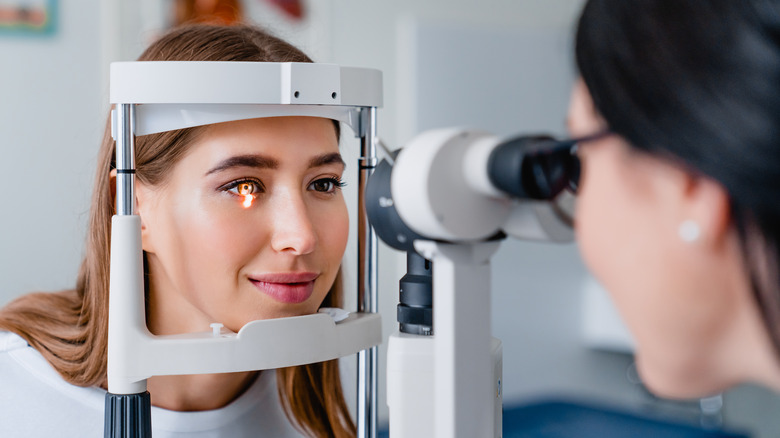Sneaky Causes Of Sudden Changes In Vision That May Surprise You
Experiencing a sudden change in vision can be unsettling and even scary. After all, our vision is one of our most important senses. While some causes of sudden changes in vision are harmless and temporary, others can be more serious. One common cause of a change in vision is dry eyes. This common condition occurs when the tear glands don't produce enough tears to keep the eyes lubricated (via Mayo Clinic). Dry eyes can cause a variety of symptoms, including blurred vision, eye fatigue, and even pain.
Dryness in your eyes is sometimes temporary, like when you have wind or air blowing in your face for an extended period of time, but these effects will wear off quickly and shouldn't cause vision problems. Chronic dry eyes that can lead to changes in vision are caused by more long-term issues like certain medications (such as decongestants, antihistamines, and antidepressants), health problems (like rheumatoid arthritis and diabetes), hormonal changes (such as during pregnancy or menopause), and some eye diseases. This condition can be treated with artificial tears, eye drops, ointments, or with some lifestyle changes.
Certain medications
Some medications can cause changes in vision, either as a side effect or because they interact with other medications you're taking (via Cleveland Clinic). The most common medications that might affect your vision include corticosteroids, antihistamines, and antipsychotic medications. Corticosteroids are used to treat a variety of conditions like allergies, asthma, and even some types of cancer. Antihistamines are used to treat allergies and cold symptoms. Antipsychotic medications are used to treat mental health conditions like schizophrenia and bipolar disorder.
These changes in vision can range from mild and temporary to more severe and long-lasting. People with preexisting eye problems or those who are at risk of developing eye problems are more prone to experiencing these side effects, although they are a risk for anyone who takes these medications. If you're taking any of these medications and you experience a change in vision, be sure to talk to your doctor right away. They may be able to adjust your dosage or switch you to a different medication.
Health problems
Certain health problems that don't seem to be related to your eyes can also lead to changes in vision. For example, diabetes can cause diabetic retinopathy, a condition that damages the blood vessels in the retina (via Broberg Eye Care). This damage can eventually lead to blindness if it's not treated. High blood pressure can also cause changes in vision by damaging blood vessels around your eyes. Rosacea, a skin condition that causes redness and inflammation, can also lead to eye problems like dryness, irritation, and even vision loss.
Liver disease is another health condition that can cause changes in vision (via Healthgrades). This is because the liver is responsible for filtering toxins out of the blood. When the liver isn't functioning properly, these toxins can build up in the body and cause a variety of problems, including vision problems. People with liver disease may experience blurred vision, yellowing of the eyes, and even blindness. Other health problems that might cause changes in vision include autoimmune diseases, Lyme disease, sickle cell disease, and nutritional deficiencies. If you have any of these health conditions and are experiencing changes in your vision, be sure to speak with your doctor about your symptoms.
Hormonal changes
Changes in hormone levels can also cause changes in vision. This is most common during pregnancy when hormonal levels are fluctuating. Pregnant women may experience blurred vision, light sensitivity, and even vision loss (via WebMD). These changes are usually temporary and will go away after pregnancy, but they can be a sign of a more serious condition like pre-eclampsia or gestational diabetes. If you're pregnant and experiencing any changes in your vision, be sure to speak with your doctor right away.
Other hormonal changes that can cause vision problems include menopause and thyroid problems (via the American Academy of Ophthalmology). Menopause can cause dryness in the eyes, which can lead to blurred vision. Thyroid problems can also cause dryness in the eyes as well as other vision problems like double vision and light sensitivity. If you're experiencing any changes in your vision that are due to hormonal changes, speak with your doctor. Using artificial tears or lubricating eye drops can help with temporary dryness, but the underlying condition needs to be addressed in order to fix the problem for good.
Eye diseases
There are a number of eye diseases that can cause sudden changes in vision (via WebMD). Some of the most common include glaucoma, cataracts, and age-related macular degeneration. Glaucoma is a condition that damages the optic nerve, which can lead to blindness. Cataracts cause the lens of the eye to become cloudy, which can lead to blurred vision. Age-related macular degeneration is a condition that causes the retina to deteriorate, which can lead to vision loss. Other eye diseases that can affect vision include lazy eye, uveitis, floaters, and conjunctivitis.
If you have any of these conditions, you may experience sudden changes in your vision. These changes may be temporary or they may be permanent, depending on the severity of the condition. Be sure to see your doctor regularly for eye exams so that any changes in your vision can be detected early and treated accordingly. Early detection is key to preventing long-term eye damage.
Excess UV exposure
We all know that we're supposed to wear sunscreen when we go outside, but many of us forget to protect our eyes from the sun. Too much exposure to UV rays can damage the eyes and lead to changes in vision (via Johns Hopkins Medicine). This is because UV rays can damage the cornea, lens, and retina. People who are exposed to too much UV light may experience blurred vision, photosensitivity, and even blindness.
Wearing sunglasses or a hat with a brim can help protect the eyes from UV rays, but it's also important to limit your time in direct sunlight. If you're going to be out in the sun for an extended period of time, be sure to wear sunglasses or other eye protection. You should also apply sunscreen to your eyelids, which is an area that many people forget about. Your eyelids are made of very thin skin and this area is prone to dryness, wrinkles, and skin cancer when exposed to direct sunlight. If you notice any changes in your vision after a day out in the sun, be sure to visit your eye doctor right away.






